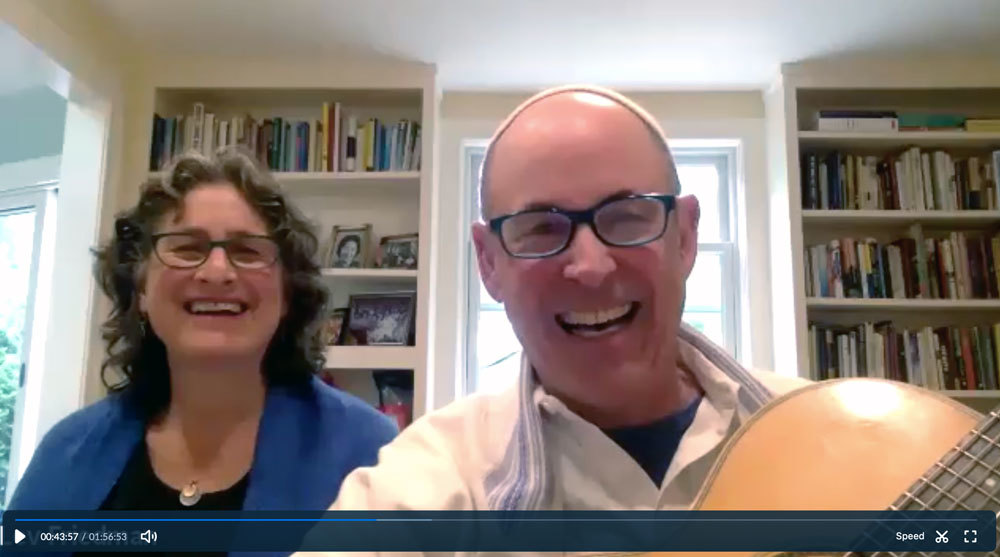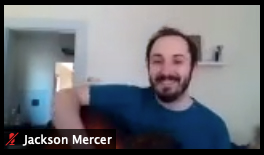Community Blog Innovation Lab Innovates in Response to the Pandemic

 After months of planning innovative educational, spiritual, social justice, and interfaith projects to address needs of the Greater Boston Jewish community, Hebrew College Innovation Lab students found themselves faced with a hands-on innovation challenge: how to innovate their projects in a newly-quarantined COVID-19 world.
After months of planning innovative educational, spiritual, social justice, and interfaith projects to address needs of the Greater Boston Jewish community, Hebrew College Innovation Lab students found themselves faced with a hands-on innovation challenge: how to innovate their projects in a newly-quarantined COVID-19 world.
Students quickly responded with resiliance–bringing joy, music, creativity, and connection to virutal communities. A day-of-study about interfaith and mixed-heritage relationships moved online. A weekend-long retreat about spirituality and social justice became a day-long Zoom conference. And a Pluralistic community of musicians and songwriters was challenged to collaborate virtually.
“Students in the Innovation Lab were implementing their projects just when the world as we knew it was changing profoundly: quarantine, isolation, the inability for the community to meet face to face,” said Rabbi Jeffrey Summit, director of the Hebrew College Innovation Lab and Emeritus Neubauer Executive Director of Tufts Hillel. “They reconceptualized their projects thoughtfully and creatively, engaging people in living Jewish practice in ways that were value-added to people’s lives and experience.”
Throughout the year, Summit said, students discussed thought leadership, courage, optimism and the factors that led to successful project innovation. They drew from Jewish texts, poetry, social and organizational psychology. Perhaps most importantly, they focused on resilience in the face of change. So when the pandemic hit, they were ready to apply their new knowledge and skills, thinking creatively to quickly innovate projects in light of the unprecedented quarantine.
Facilitating Interfaith Dialogue
Rabbinical student Lorin Troderman, who was organizing an in-person day-of-study for emerging Jewish spiritual leaders and community members to discuss the challenges and opportunities of interfaith and mixed-heritage relationships, said while the modified Zoom-based format didn’t allow as much conversation as he had anticipated, “each speaker was compelling, authentic and articulated a personal experience that landed strongly with the participants…. demonstrating that it was possible to create a stimulating and successful learning environment online as we headed into uncertain times,” he said.
Integrating Spirituality & Social Justice
Rabbi Mimi Micner, Rab`20, who was coordinating a weekend-long retreat for young adult Jewish activists to integrate Jewish spirituality into social justice work, said a day on Zoom “could not replicate the feeling and kind of connection that happens in an immersive experience,” but the participants still felt “energized and ready to open a new path in integrating their social justice work with Jewish wisdom and spiritual practice.”
Building Community through Virtual Songwriting

Finding hope and spirituality in an uncertain time
In moving online, Rabbinic student Jenna Shaw’s “Soul Squad,” a spirituality fellowship for college students at Boston University,” was able to utilize guest speakers who don’t live in Boston to speak about the ways that they connect to Judaism and spirituality. These included a doctor on the front lines of the COVID pandemic, who discussed how he and his colleagues found moments of hope and spirituality during the pandemic. “In the complicated world that erupted following school shifting online, Soul Squad took a different shape than its intended plan,” Shaw said. “I am proud that we were still able to maintain a lot of this sense of creativity and experimentation online. Of the students who participated, most of them mentioned that Soul Squad altered what it means for them to have a Jewish life.’’
Creating a Joyful Prayer Community
Azamra, the alternative monthly Shabbat minyan led by Rabbi Lev Friedman, Rab`18 (pictured above with his wife, Joyce), grew throughout the year, often drawing more than 100 participants, and successfully transitioned online at a time when many people were longing for connection and community. But Rabbi Friedman said it just wasn’t the same as meeting together for prayer and song. “I, and so many others, really miss the communal singing and actually being together. But Zoom is a better alternative than being isolated from one another, and while we look forward to being in the same physical space, the folks who attend regularly are grateful for the opportunity to meet together virtually,” Rabbi Friedman said.
Continuing Innovation Projects into the Future
Not all projects were able to innovate as easily. Rabbi Noam Lerman, Rab`20, who was creating an interactive online database where Yiddish women’s liturgy could come to life in song, had to push back their timeline and order their own equipment in order to complete their project. Moshe Webber postponed his immersive learning experience for Converts to Judaism to next summer. And Michelle Goldhaber, who was planning an exchange program between Hebrew College and the Ukrainian Catholic University in Lviv, Ukraine, had to cancel the trip because of the pandemic, but hopes that a move to Zoom conversations will allow relationship building throughout the next academic year, in preparation of a live meeting in 2021.
Rabbinic student Micah Friedman’s project Nehgeh B’Lailah relied on close personal interaction, deepening participants’ connection to Shabbat by gathering people to study mystical texts and song during Shalosh Seudos (the third meal) at the conclusion of Shabbat. His programs drew more than 30 participants, but had to be reconceptualized when face-to-face meetings were no longer possible. Friedman said, “I decided to create a series of videos online in which I would teach some Hassidut about mystical conceptions of Shabbat and practices that can help us to connect to these ideas titled Cultivating Shabbos in order to meet my goal of creating space for collaborative and reflective conversation about spiritual practice and Shabbos.”
“The pandemic was a tremendous challenge this year, and just at a time when the Jewish community needed more creativity, this group reconceptualized what they were doing to offer meaningful connection during this complicated time,” said Rabbi Summit. “In some instances, projects were even more accessible than originally planned. Others will continue to innovate to address and support the needs that people have in this ever-changing landscape.”

